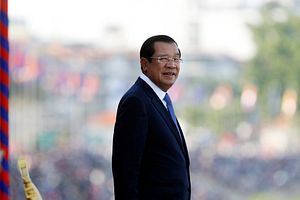On Monday, Hun Sen, the prime minister of Cambodia, pushed back directly on the notion that the Chinese government had — or would be — receiving exclusive rights to have its military access facilities on his country’s soil. The Cambodian leader’s comments came after months of scrutiny of the matter and focused specifically on the question of whether the Chinese People’s Liberation Army Navy would be first in line to use a naval base on Cambodia’s southern coast.
The base in question, the Ream naval base, is off the Gulf of Thailand and was the subject of a Wall Street Journal investigation last year, which alleged that Beijing “signed a secret agreement allowing its armed forces to use” the base. Senior U.S. officials have publicly and private expressed concern about potential Chinese basing on Cambodian soil, with U.S. Vice President Mike Pence having sent a letter to the Cambodian prime minister in 2018 to express concern.
Hun Sen hasn’t been evasive on the question of basing and has taken it on head on previously. On Monday, he continued his denials, citing Cambodia’s constitutional restrictions on allowing for foreign military basing. “If one country’s warship is allowed to dock at our navy base, the other countries’ warships will be able to dock, too. We are not going to close it to anyone,” the Cambodian prime minister said.
Hun Sen’s phrasing was narrowly focused on the idea of a foreign warship making use of Ream — activity that could theoretically take place short of basing. In fact, his statement does not rule out potential access by multiple countries.
The notion of Cambodia consenting to Chinese military basing explicitly has been around for a couple years now—and even longer in the context of the generally warm relationship between the two countries. The Cambodian government has been among the most friendly toward China of the ten member states of the Association of Southeast Asian Nations.
Geographically, military basing in Cambodia does not offer the Chinese Navy direct access to the region’s most contentious waterways in the South China Sea, but it does allow for a considerably useful westward logistical node that could support more regular operations into the South China Sea and into the Sea of Malacca and beyond it, into the Indian Ocean region.
Cambodian Prime Minister Hun Sen, in part, has sought to make the case that China would not need a base on his country’s territory given Beijing’s considerable militarization of the South China Sea. Defense cooperation between China and Cambodia has been expansive in recent years, with Beijing by far being the country’s top defense equipment supplier.
Hun Sen’s government has also looked to China particularly as Western democratic government have grown more critical of the state of governance in Cambodia.
According to the Wall Street Journal, the alleged secret deal between China and Cambodia would have seen a Chinese company construct two new piers at Ream naval base in exchange for access.
While the notion of Chinese basing in Cambodia continues to receive geopolitical interest, the military utility of the PLAN operating out of Ream remains unclear. Although, if confirmed, a Cambodian facility would represent the PLAN’s potential second overseas based, with the first being off the east African coast at Djibouti, Ream’s relatively shallow waters and proximity to already existing Chinese facilities may mean it is less transformative for the PLAN’s overall global role.
One consideration for China may be Ream’s proximity to Vietnam. Tensions between Beijing and Hanoi have fast grown in recent years over heightened tensions in the South China Sea, where the two countries have overlapping claims in the Paracel and Spratly Islands. Chinese access to Ream could facilitate a higher tempo of Chinese naval operations in the waters off Vietnam’s coast.
Taken in line with Djibouti and other civilian facilities with a potential dual-use future, Ream could represent an important node in what could one day be a more expansive network of Chinese military bases around the region.
For now, Hun Sen’s denials of explicitly exclusive access are likely to be unconvincing to countries concerned about potential Chinese basing on Cambodian soil.
































